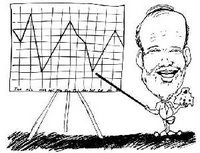
MARKETING TIPS For a Newly Listed Home
Every home seller can benefit from some simple tips before putting his residence on the market. For example, a pre-listing inspection could help identify the components of the house that are most in need of repair — which will make the home unattractive to potential b u ye r s. Homeowners who hire a qualified inspector will find it well worth their investment. Here are the common problem areas that are typically identified by home inspectors. Early correction of these problems will increase the house’s marketability (and its selling price!).
1. CHECK THE MAJOR SYSTEMS. After size, style, and location, nothing will sell a house quicker than the good condition of the home’s basic structure and major mechanical systems. A pre-listing inspection of visible and accessible home components can reveal problems in the structure and systems, and an inspector will recommend the necessary repairs. The most important components to consider are the roof structure and covering; the foundation, basement or crawl spaces; the central heating and air-conditioning systems; the electrical and plumbing systems.
2. MAKE MAINTENANCE IMPROVEMENTS. These basic, simple, and usually inexpensive improvements will make the home more appealing to buyers. After all, first impressions count, so make the home “drive-by perfect” by trimming trees and shrubs, applying new caulking or weather-stripping as necessary, cleaning gutters of leaves and debris, and making sure all windows are free of cracks. Inside, the homeowner should replace bathroom caulk or grouting, ventilate closed basements and crawl spaces, re-grade the soil around the foundation to keep water away from the house, replace dirty filters in the climate control systems and have the systems professionally serviced, and maintain chimneys, having them professionally cleaned and installing hoods or caps as needed.
3. PAY ATTENTION TO DETAILS. Fixing minor problems as they occur will indicate “loving care” to the potential buyer. The homeowner should repair leaky faucets, tighten loose doorknobs, replace damaged screens and windows, repair driveways, repaint walls and ceilings, and make sure all railings are secure. These simple steps will make sure the buyer doesn’t leave with a bad impression.
4. TAKE SAFETY PRECAUTIONS. Inspectors pay attention to the items in the home that will help protect the dwelling and its occupants. Homeowners should install a smoke detector on each level of the home, keep flammable products away from water heaters, general heaters and fireplaces, and install Ground Fault Circuit Interrupters in wet areas, such as the kitchen counter tops and bathrooms.
5. MAKE COSMETIC IMPROVEMENTS. In the world of real estate, looks do count, so homeowners should do all they can to assure their home is neat and attractive. Make sure the lawn is mown regularly, exterior walls and trim are clean, and the house is neat. Open windows and shades to let in light (which will give the home a bright appearance) and make sure those “hot spots” that buyers inspect closely — like kitchens and bath-rooms — are up to the “white glove” test. The homeowner should have house records on hand to answer questions easily and confidently. Appliance receipts, service records, and warranties should be easily accessible, as should information about all major components (heating, air-conditioning, carpeting, etc.). Also have copies of the latest bills on hand to give prospective buyers an idea of their cost.
Energy Systems
It is important for the homeowner to be knowledgeable about his energy systems. For example, he should not give the “go ahead” to landscaping without checking the placement of the plants in regards to his outside air conditioning unit. Manufacturers agree that plant life should not be any closer than 18" from the unit in order to allow the air conditioner to take in and let out air efficiently. If the air does not circulate properly, the unit could build up heat and require professional service. It is not necessary to cover an outside unit. Sometimes rain on a unit is beneficial, as it helps to keep the unit clean. Heat pumps, which run all year long, should never be covered. All A/C and heating equipment is rated as to efficiency. The higher the rating, the more energy efficient the model is. For a cooling system, the rating is a Seasonal Energy Efficiency Rating (SEER). The heat pump rating is Heating Seasonal Performance Factor (HSPF) and gas furnaces are rated with Annual Fuel Utilization Efficiency (AFUE). Sometimes humidity in an area is a bigger problem than heat. The best way to control excessive humidity is to purchase a system that runs longer at lower speeds. Variable speed air handling equipment keeps the air circulating against the cooling coil. This removes much more moisture than conventional systems, and it’s more efficient, too, because at lower speeds, the variable speed motor uses much less electricity than conventional motors.
Article courtesy of Door2Door Homes Inspections Siraj (AJ) Andani 416-728-9110
More information on Home Inspections
For more information please contact A. Mark Argentino
A. Mark Argentino, Broker, P.Eng.,
Specializing in Residential & Investment Real Estate
RE/MAX Realty Specialists Inc., Brokerage
2691 Credit Valley Road, Suite 101, Mississauga, Ontario L5M 7A1
BUS. 905-828-3434
FAX. 905-828-2829
E-MAIL: mark@mississauga4sale.com
Website: Mississauga4Sale.com










No comments:
Post a Comment